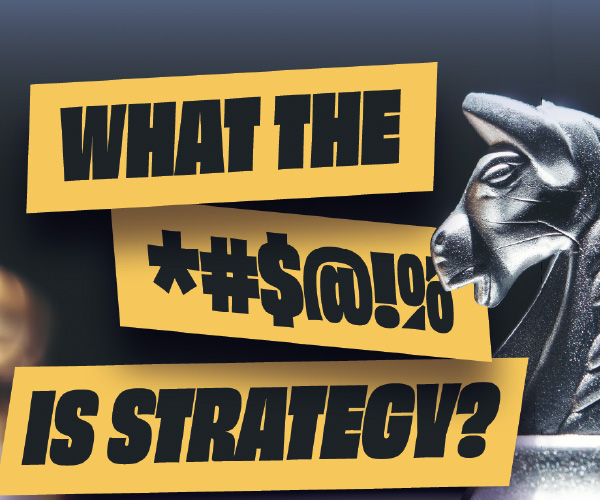
What the $%^*& Is Strategy?
April 5, 2023
7 minute ReadBy Nick Fortuna
Herm Edwards, the former NFL coach known for his intensity and colorful quotes, has a no-nonsense reply on the tip of his tongue when people articulate their hopes and dreams: “A goal without a plan is a wish.”
Edwards might not know how to run a car wash, but his logic holds true for car wash operators planning for the long term. Nowadays, businesses of all types are harnessing the power of data to make better-informed business decisions and to establish goals based on metrics. But simply achieving those goals might not be enough to secure a car wash company’s future success. Instead, car wash owners and operators should have a plan, or a comprehensive business strategy, that includes goals based on metrics as one measure of success. Beyond that, the strategy should provide a roadmap for the business that examines emerging trends in the industry, the threat of new market competitors and regulatory factors such as water and chemical usage.
“Your strategy is bigger than your goals,” said Dr. Jim Davis, founder of the Gigot Center for Entrepreneurial Studies at Notre Dame. He currently heads the marketing, strategy, leadership and entrepreneurship (MSLE) department at Utah State University’s Huntsman School of Business.
“Strategy is all about positioning the company for increased performance and better returns, however the organization measures success, and for a family business such as a car wash, that may not be strictly financial performance,” he said. “Maybe success to them means passing the business on to the next generation.”
Strategy may include plans for dealing with disruption, innovation, leadership, governance of the business and labor issues, Davis said. “It’s putting all of the pieces of the business system together to most effectively achieve your desired performance outcomes, and it’s fairly comprehensive,” he said.
Car wash operators may set specific goals, such as driving down the cost of labor per car, increasing revenue per car, adding members to their unlimited wash club and boosting the lifetime value of those members. But if they’re relying solely on short-term key performance indicators to measure success without a vision for the future, they’re neglecting several important components of a sound business strategy, Davis said.

Saturation and conservation
Strategy should include plans to address current and anticipated market disruption, including two of the biggest issues clouding the future for operators: market saturation and the urgent need to conserve water in drought-stricken areas like the American West, Davis said.
The car wash industry’s reliable and healthy returns over the years have led to increased competition for local operators, so they must have a strategy to maintain customer loyalty, he said. For many customers, pricing and proximity to their home or job determines which car wash they visit. But it’s possible to win loyal customers by differentiating your car wash and providing exceptional service, he said.
Friendly, professional employees, light shows and music in the tunnel and rewards programs are among the ways car washes can keep customers coming back for more, even after new competitors enter the market, Davis said.
“It’s about finding novel ways to maintain that alliance with your customers,” he said. “We often think that all solutions come down to investment and finance, but not always. Sometimes strategy and brand management save the day. There’s no better way to maintain your brand and build clientele than being agile and thinking forward. Eventually, you’re going to become irrelevant in your markets if you’re not strategic. Many people think of this as a labor-free industry, but successful car washes are strategically positioning labor to hook the customer and promote the brand.”
There are times when strategy does require significant investments, however. A prime example for car wash operators is the need to upgrade their wash systems to conserve water, especially in areas where new water restrictions are increasingly likely, and to select the greenest chemicals available.
Car washes that anticipate change and invest in sustainability are sending a message to the market that they’re leading rather than following, Davis said. By leading, car washes enhance their brand’s reputation, whereas if they wait to react to new regulations or public outcry for greener business practices, they risk damaging their brand image, he said.
Making informed decisions
At its core, strategy boils down to a car wash’s decisions, said Dan Flatley, president of Suds Creative, the marketing and analytics arm of DRB.
“Which things are you going to decide to do and, maybe even more importantly, which things are you going to decide not to do? In my mind, that’s really what strategy is about,” Flatley said. “You need to have goals, and those goals should be tied to metrics, and those metrics should be underpinned by data, but the strategy should almost float above that.”
Data can reveal insights into a business, allowing it to establish baseline metrics and to identify what it must do to improve them, Flatley said. But raw statistics don’t provide a complete picture of a company’s performance or how well it’s prepared for the future. Those figures also do nothing to establish a company culture that brings out the best in employees and ensures that customers leave the lot happy.
That’s why clarity and simplicity are really important in a business strategy, Flatley said.
“Your front line operators need to be able to walk into the break room, look at a single poster on the wall and recognize that what they’re doing on any given day is part of a holistic business strategy,” he said. “If you can’t communicate your business strategy to a customer or employee in 15 seconds, you probably need to make it less complicated. Your goals may be financially driven and operationally focused, but with a clear and simple strategy comes flexibility, so that if there are changes in the marketplace, you can meet them more easily.”
Focusing on employees
Breeze Thru Car Wash, with 12 locations in Colorado and Wyoming, has developed a strategy that’s both simple and ambitious: to be an excellently run car wash company that prepares people for the future and provides for the community. Toward that end, Breeze Thru has launched several employee development programs aimed at gaining a strategic advantage over time.
Workers make a minimum of $17 an hour and can raise that rate by $4 within 15 months by completing Breeze Thru’s advanced training program. Workers are eligible for paid sick leave immediately, and after 90 days of employment, they can get health benefits and paid time off.
After a year, the company’s 401(k) program kicks in with a 3.5% employer match.
Last January, the company launched a two-year manager accreditation program combining instruction in car wash operations and business management.
The program gives employees a clear path for advancement and helps to boost retention, which should lead to a better experience for customers, said ICA member Jonathan Comyn, chief operating officer at Breeze Thru.
“We’re creating competent managers that are ready to support and develop their employees,” he said. “We believe that if you take care of your employees, they’ll take care of your customers, and the revenue and profits will follow.”
“That strategy differs from the one favored by many private-equity groups that have entered the marketplace recently,” said ICA member Wade Keith, brand manager at Breeze Thru. “By focusing on cutting costs and improving the bottom line in the next quarter or two, these companies are paying short shrift to both the employee journey and the customer journey, which are vital to a car wash’s long-term success.”
“Are we concerned about our competition?” Comyn said. “Absolutely, but sometimes you have to look inside your organization first. How are you treating employees and customers? Are you building an organization where the customer will see value in staying with you and not going to the new, shiny car wash down the street?”
Breeze Thru offers discounted housing to some employees, too, a key factor in attracting young workers, according to Comyn. Plus they provide a full uniform to employees and have partnered with a retailer to give workers access to quality work boots and gloves at a discount, Comyn said. The company also uses employee engagement surveys and incorporates that feedback into its decision-making, giving workers a sense that their concerns and suggestions truly matter.
Those initiatives improve retention, and when customers see the same employees time after time, they build a rapport with them, which drives customer loyalty, he said. Breeze Thru spent considerable time mapping out the journeys of employees and customers from start to finish and now displays those maps at company headquarters, Comyn said.
Executives took the time to apply for entry-level jobs and go through the interview and onboarding process, searching for pain points that prevent the company from landing good prospects.
“We’re here to provide a good experience for the customer and the employee, and that’s our competitive advantage,” Comyn said. “We look at metrics, but we don’t want to manage completely based on metrics. You have to be adamant at defining what you’re trying to accomplish, and that will help you to figure out your strategic advantage.”

How to Build a Business Strategy
There are 11 steps to building a successful business strategy, according to HubSpot, which was founded by two MIT graduate students and strives to empower businesses around the world to stop interrupting, start helping and return their focus to the customer.
- Identify your business’ aspirations and values.
- Conduct a self-assessment.
- Pinpoint which segments of your market you want to capture.
- Determine how you’ll beat your competition.
- Set clear goals.
- Make a plan.
- Figure out which competencies are needed to beat your competition and sustain your business’ success.
- Decide which management systems are needed to hone these competencies.
- Measure your results.
- Be flexible and willing to adapt.
- Consider hiring a business consultant.
Join ICA for more exclusive content from CAR WASH Magazine.








